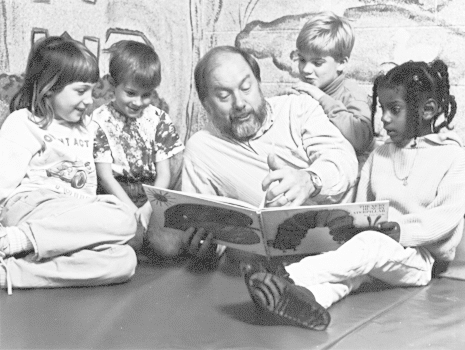Center for Early Learning and Childhood Development
 
|
Mission Statement
|
|
The overall mission of the center is to provide exemplary training,
research, and service for children between birth and eight years of age, their families
and the personnel who work with them. This mission includes both children with and without
disabilities. The training mission focuses on providing a wide range of didactic and
experiential opportunities for initial and advanced training in early childhood education,
special education and related professions.
The research mission encompasses applied studies of factors affecting cognitive, social
and emotional behavior as well as the testing of methods for enhancing development and
learning in young children.
The service mission is to provide model programs, instruction, and supportive services
for typically developing children and children with special needs, their families and
other early childhood service providers. |
Goals and Objectives
|
|
The overall goal of the center is to achieve external funding for and to
carry out projects consistent with the center's training, research, and service missions
and to effectively disseminate information about these projects to both professional and
lay audiences. Some selected objectives of the center are to:
- Pursue and secure funding to provide a range of high quality, exemplary training
experiences.
- Conduct studies of literacy, classroom adjustment, behavior problems and social
development in young children.
- Examine the long-term development of children at high risk for developmental delays or
disabilities.
- Provide innovative services and assist other early education and intervention programs
in their delivery of services,
- Advocate for validated practices at the local, state, regional and national levels.
|
Introduction
|
|
The Center for Early Childhood Learning and Development, founded in 1985,
focuses on research, teaching and service to children from birth to age eight, their
families and the personnel who interact with them. Starting out as the smallest Center of
Excellence in Tennessee, the center has grown dramatically over the years. It began as an
outgrowth of ETSU's Child Study Center and the broad interdisciplinary interest in
children and families expressed among ETSU faculty. |
Research and Funded Activity
|
|
Over the years, the center's record of attracting external funding has
expanded from two projects annually to eight. All funded projects are used to provide an
applied research base to support new approaches and improvements in child care, education,
early inter- vention and personnel development. Examples of major projects include: TECTA,
the Tennessee Early Childhood Training Alliance, a subcontract developing and delivering
training for child care providers, funded by the Tennessee Department of Human Services
through a contract with Tennessee State University.
Supporting Families, a project serving high risk infants and families, funded by the
Tennessee Developmental Disabilities Council.
STEP (Systematic Training for Effective Programming), First Stage, and Respond; all
federally supported training projects funded by the U.S. Department of Education to
prepare personnel in early childhood special education and severe disabilities.
A federally funded research project that identified critical school adjustment and
social skills for preschool and elementary aged children. |
|
 |
ONCE UPON A TIME -
Dr. Wesley Brown reading to students at the Child Study Center |
Educational Opportunities
|
|
The center provides educational opportunities to more than 1,300 ETSU
students and regional professionals annually. The center is involved with faculty and
students from 13 ETSU departments in six colleges. Additionally, the center has
extensively supported ETSU academic programs in the Department of Human Development and
Learning through teaching and service. Center faculty have participated in the development
of new undergraduate and graduate degree programs in early childhood development and early
childhood special education. These programs have grown in reputation and in numbers of
faculty and students, Through its operation of the Child Study, the center provides
training opportunities for students and professionals. Mentoring programs are provided for
graduate assistants and early childhood supervising teachers.
Children First, a Program which works with over 200 families each year and is part of a
statewide early intervention network, serves as a training site for early childhood
special education and nursing students as well as medical students and residents.
The Developmental Pediatrics Training Program works with the Department of Pediatrics
to provide opportunities and experiences in developmental pediatrics for pediatric
residents. It has served as a pilot for a new federally funded proposal submitted this
year.
Tennessee Early Childhood Training Alliance has developed training for a network of
sites in Tennessee and provided basic early childhood training during its first 18 months
to 120 child care providers in eight counties.
A variety of other service delivery and demonstrations programs have been conducted to
serve Tennessee children and families while providing training opportunities for
professionals and paraprofessionals. |
Services Provided
|
|
The direct goal of many of the projects funded through the center is to
provide services to Tennessee children. The center provides model programs and service
activities regarding exemplary approaches for serving both typically developing children
and those with disabilities. These programs have been recognized for their positive impact
at the regional, state and national levels. Center personnel have received three ETSU
distin- guished faculty awards, including those designated for both outstanding teaching
and outstanding research. They have also received state and federal appointments to
commissions and advisory councils. The director was recently recognized by Governor
McWherter for his service with developing state programs in Tennessee. |
Conclusion
|
|
In the second decade for the Center for Early Childhood Learning and
Development, we will continue our well established directions related to early childhood:
to achieve national prominence, to contribute knowledge and service, to enhance teaching
and learning, and to attract funds to support our mission.
|
  |

